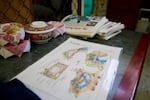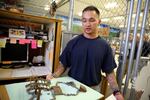
Members of the Asian Pacific Family Club at the Oregon State Penitentary stand in front of the club's small office space inside the prison. In front of them are designs for a healing and restorative garden they're working to build at the prison. From left to right: Jimmy Kashi, Walter Taitinfong, Johnny Cofer, Toshio Takanobu, Kevin O'Hara and Scott Bitter.
Ericka Cruz Guevarra / OPB
Walter Taitinfong grew up on the island of Saipan, a commonwealth of the Northern Mariana Islands — the kind of place publications refer to as "the most beautiful place in America you've never heard of."
Taitinfong left Saipan for the U.S. mainland in 1996, but he still remembers what it felt like to be in the island's jungles, to hunt and fish from the turquoise seas. He remembers even now, from behind the gray, concrete walls of the only maximum security prison in the state of Oregon.
Life inside the Oregon State Penitentiary in Salem is an island of its own — a sterile, dull one where palm trees are replaced by steel, metal and concrete towers. But for the remainder of his 10 1/2-year sentence, Taitinfong, along with members of an official OSP-sanctioned Asian Pacific Family Club, will build what will be the first solar-powered healing and restorative garden inside a U.S. prison.
"I think back to when I'm in the jungle, in the islands, fishing or hunting, you know. And there's a certain peace when you're in that space," Taitinfong said.
"I look at the memorial garden project and I think about that same feel. For me, not just for the Asian Pacific Islander people but for every adult in custody here, that [garden] would help them decompress — 'get right,' if you will."

The Oregon State Penitentiary in Salem is the oldest prison in Oregon and the only maximum security institution currently operated by the Oregon Department of Corrections.
Ericka Cruz Guevarra / OPB
The garden will be an 85-by-55-foot experience tucked behind a prison housing building. It will include a koi pond, a small waterfall and a lotus garden.
The idea for the project first arose in 2014, when the former superintendent of the penitentiary asked the presidents of all the OSP-sanctioned clubs to come up with ideas to help beautify the prison.
The Asian Pacific Family Club took the lead, pitching an idea for a koi pond that eventually grew into an entire garden. But the prison wasn't expecting anyone to come up with such a big idea, so the inmates were tasked with figuring out how to pay for it on their own.
The club isn't exactly what you might think of when you imagine a group of men segregated by race in a prison setting. For one, the group's 150 members are not just Asian, and "family" is quite the literal descriptor. The club's president, vice president and secretary are all cousins.
But men from all walks of life gather with the club weekly to work on developing skills to help reintegrate into life outside prison walls while celebrating and learning about Asian and Pacific Islander culture.

Walter Taitinfong (left) and Johnny Cofer (right) in front of the Asian Pacific Family Club "cage" at the Oregon State Penitentiary activities floor. Taitinfong is the club's secretary, and Cofer is the garden's project manager.
Ericka Cruz Guevarra / OPB
"We carve out places in here where we can try to feel some sense of safety to connectivity to people who are like us; the culture of prison breeds that," said Johnny Cofer, the project coordinator with the Asian Pacific Family Club.
"It creates a lot of anxiety, a lot of stress. To me, this [garden] will be the first place where it's all-inclusive, where everyone can go there, of any culture, of any power structure, staff, inmates. We can all go there and feel some sense of safety, some sense of peace. In this type of place, that's almost unheard of."
A project of this magnitude has never been accomplished from inside a prison. Club members say it's easy to lose hope for anything in the prison — a place where they're often told what to do and when to do it; a place where some of the men will live out the rest of their lives.
"My initial reaction of this was of absolute skepticism," said Jimmy Kashi, the vice president of the Asian Pacific Family Club. "I had a hard time idealizing how we would make this happen — whether it was funds, whether it's community support, whether we could do it ourselves."
A project led by inmates was accomplished once previously, when the OSP Veterans Association Club succeeded in constructing a Veterans' Memorial Wall. The club's president, Kevin O'Hara, helped the Asian Pacific Family Club navigate the process of working with the prison administration on a project from the ground up.
Then the club got in contact with Hoichi Kurisu, a recognized designer of Japanese gardens worldwide. Kurisu, who supervised the construction of the Portland Japanese Garden, made site visits to the prison with his daughter Michiko to understand the club's vision and hopes for the space.

Garden designs by Hoichi Kurisu on a table inside the Asian Pacific Family Club's small office space at the Oregon State Penitentiary.
Ericka Cruz Guevarra / OPB
"We had regular design meetings like we would with any other client: What are your needs? What are the restrictions? What are the site specifications?" Michiko said. "And certainly inside a maximum security prison, the restrictions are different than anywhere else."
The men were polished and organized, almost more so than the people Michiko knows outside of the walls of prison, she said. The men presented their proposals to prison administrators, and Kurisu International donated about $80,000 worth of designs, material, machinery and labor needed to construct the garden.
"When you speak to people who have dared to hope for something like this, something that hasn't been done before and that no matter how you look at it will be very difficult to do, it gets you thinking about what is freedom and what's not freedom," Michiko said.
"Hoichi feels very strongly that many of us outside of prison are also in prison, that we limit ourselves in so many ways and we are limited by life in so many ways, whether or not you're a convicted criminal."

Toshio Takanobu, president of the Asian Pacific Family Club at the Oregon State Penitentiary shows off his original plan for the garden, which he put together using paper mache.
Ericka Cruz Guevarra / OPB
Michiko said it was a no-brainer to put a garden inside a prison. Gardens, she said, bring people closer to nature, but also to themselves. There's symbolism in every corner of the garden.
"Being Asian-American I thought: How can I bring some of our culture back and have it represent us?" said Cofer, who's Vietnamese, Chinese and Caucasian.
"Lotuses grow up out of the mud and through the water and come out pristine and white and beautiful, clean and pure," he said. "It symbolizes us going through struggle, being washed clean, purified."
At the end of the day, the garden exists within a larger conversation about rehabilitation for America's more than 2.3 million prisoners.
"The ultimate goal is like, how do we make sure we reduce recidivism rates, [that] when they get out they stay out," said Karn Saetang, the National Korean American Service & Education Consortium (NAKASEC) national organizing director working with the men on the garden.
"We’re hearing it from actual people who are incarcerated, that 'this is what's going to help us.'"
The inmates have so far raised about half of the $165,000 needed through fundraising efforts in collaboration with outside organizations like NAKASEC, in addition to community partners. The inmates must raise all the money before they can build, as part of their agreement with the OSP administration.
"The biggest obstacle we're finding is it's a very expensive project," said prison Superintendent Brandon Kelly. "The biggest thing is just trying to figure out: OK, we've got some pretty generous donations thus far. How do we do this legally and ensure that we do this the right process and follow it through, and that we don't jeopardize the end means by doing something incorrectly along the way?"

Superintendent Brandon Kelly sits inside his office at the Oregon State Penitentiary.
Ericka Cruz Guevarra / OPB
Walter Taitinfong, meanwhile, has just three years left on his sentence. When he's released, he'll leave behind his two cousins — one serving 27 years, the other doing life.
But he's also close to leaving behind a space, a garden, that will remind them of what they accomplished when the odds were stacked against them inside Oregon's oldest state prison.
There, he hopes, his cousins and all the other men who walk through the prison will go to decompress, maybe prepare for the possibility of life outside prison walls, or come to peace with the only life they will ever know from now on.